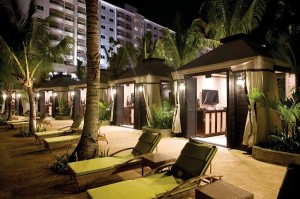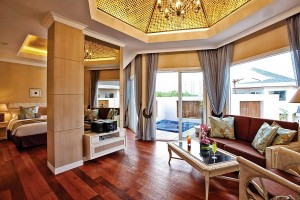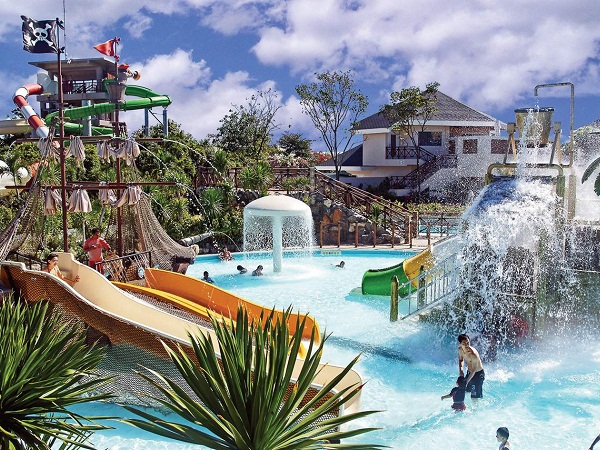Combining fruit exports and tourism
CEBU CITY – Processing and exporting mangoes seem to be worlds apart from owning part of a luxury resort.
But for Justin Uy, president of Profood International Corp., acquiring a stake in the Imperial Palace Waterpark Resort and Spa was a natural progression.
In selling their products abroad, Uy says he has been promoting Cebu and the country as a destination.
The calendars and brochures Profood had given to customers and prospective clients feature the Philippines’ different tourism sites.
Profood products even use the Cebu and Philippine brand to show to the world that the Philippines, and Cebu in particular, has the best dried mangoes.
His efforts paid off since the family-owned Profood has made its mark in the processed mango industry. The company has expanded its operation to processing of 15 fruits and has become the biggest processed mango exporter in the Philippines.

THE LUXURY resort, which opened three years ago, is the biggest in Cebu as it sits on an eight-hectare property. The hotel has 556 rooms—128 deluxe rooms, 380 suites.
Indeed, when he put up the dried mango business in 1980 to help his family, Justin Uy never dreamt it would turn out to be a huge success.
Now, Profood International Corp. has become the country’s biggest exporter of processed fruit products, including dried fruits and juices.
Then, about a year ago, the family decided to go into real estate, banking on the positive outlook of the tourism sector.
The family-owned Everjust Realty Development Corp. acquired part ownership in the Imperial Palace Waterpark Resort and Spa.
The luxury resort, which opened three years ago, is the biggest in Cebu as it sits on an eight-hectare property.
The hotel’s Waterpark features themed pools such as the Amazon River, the Wave Pool, the Beach Pool, the Captain Hook’s Pool and the Toddlers Pool. The Waterpark also has slides—Open Body Slide, Tube Slide and Space Bowl.
The hotel has 556 rooms—128 deluxe rooms, 380 suites and 48 pool and jacuzzi villas. With its four meeting rooms and a grand ballroom that could seat up to 600, the hotel also would like to attract different functions such as business meetings, conventions and exhibitions.
The resort has been doing well, Uy says.
While 75 percent of Imperial Palace’s guests are Koreans, he says, they are also promoting the hotel to other countries in Europe, especially Russia.
“In fact, we have a Russian desk,” he adds.
Uy sees bright prospects for the tourism sector.

However, he says, the government has to put very good infrastructure as well as provide peace and order and convenience for tourists.
Even the problems on garbage and informal settlers also affect tourism, he adds.
“I am not saying that the government should relocate the squatters. Just do something, like painting their huts,” Uy explains.
The lack of direct flights to and from international destinations like Taiwan and China also hampers tourism growth.
He urges the government to address the concerns of international airlines, especially the high fees charged by airports, to encourage more international direct flights.
Uy recalls that Qatar Airways withdrew its flights to and from Cebu because of viability issues.
Early this year, Qatar Airways, which had served the Doha-Cebu route thrice weekly, announced it would discontinue its service to Cebu despite the high demand due to “commercial reasons.”
Everjust, however, continues to show confidence in the tourism sector as it intends to build a business hotel on top of the J Centre Mall, a retail business it owned in Mandaue City.
Uy says the project cost of the 20-floor hotel is estimated to be around P800 million.
They are negotiating with an international company to manage the hotel, he adds.
“It will be an international hotel. We are in final negotiations with an international brand to manage the hotel,” he says.
The company will be bidding out the project this month and the construction is expected to start before the end of the year.
Uy says it would take between 18 months to 24 months to complete the hotel project, the first of its kind in Mandaue City.
The company’s involvement in the tourism industry has also resulted in the implementation of another tourism venture “the Profood Gallery” (Mango Museum).
The company invested around P20 million in the 3-level facility in Profood’s manufacturing facility in Mandaue City. The gallery, which was patterned after the M & M Chocolate tour, enabled tourists to learn the entire cycle of the mango processing industry.
The gallery has two small theaters where a video on the processed mango industry is shown.
Aside from tourists, the gallery has also attracted student group tours.
Uy stresses that he remains optimistic over the prospects of the tourism industry.
But he adds that the government has to be serious in addressing the various concerns of the industry so the country could realize its full potential.

